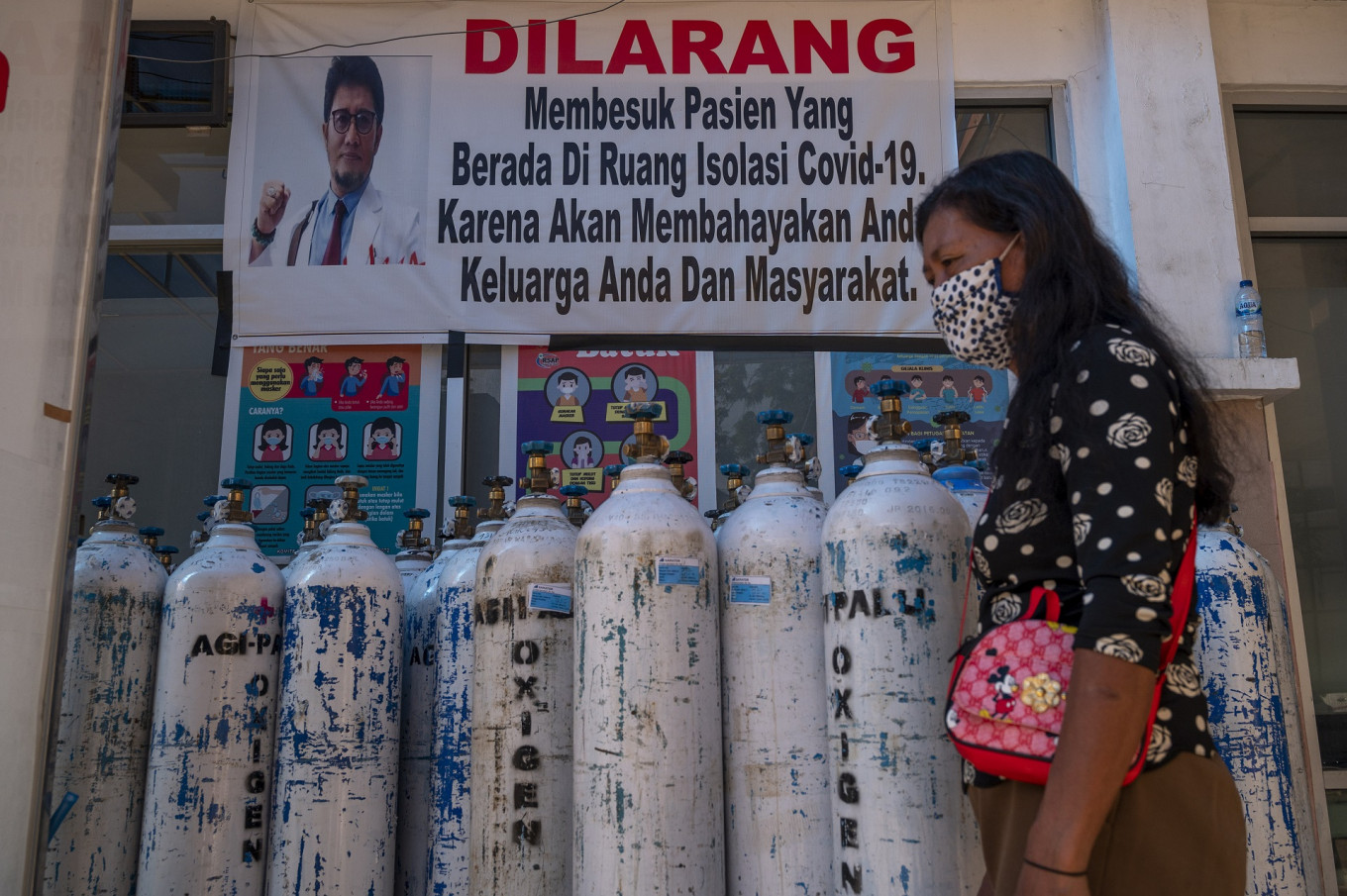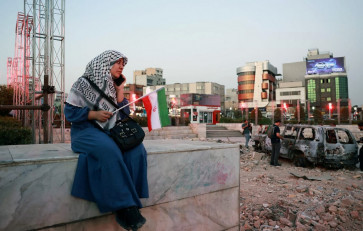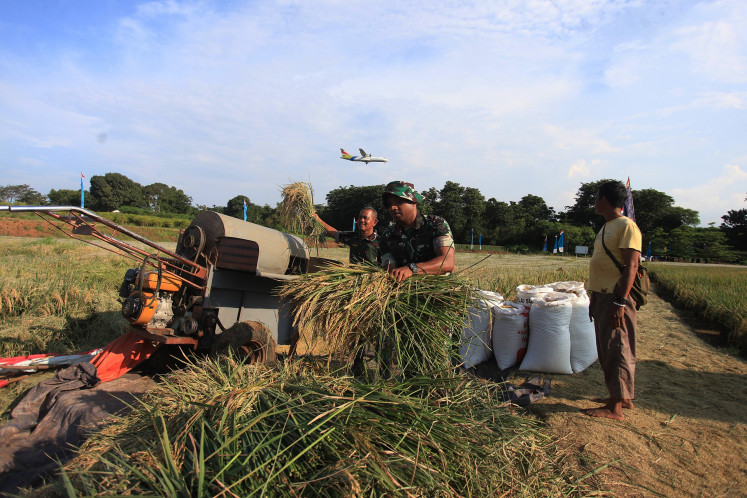Popular Reads
Top Results
Can't find what you're looking for?
View all search resultsPopular Reads
Top Results
Can't find what you're looking for?
View all search resultsRisk communication key as virus deaths surpass 30,000
After becoming the first country in Southeast Asia to reach the 1-million mark of COVID-19 cases, Indonesia has recorded nearly 30,000 deaths because of the coronavirus disease.
Change text size
Gift Premium Articles
to Anyone

T
he lack of proper risk communication by the relevant authorities has been blamed for the worsening COVID-19 pandemic in Indonesia, which recently saw its case number pass 1 million, with 30,000 deaths, including over 600 health workers.
Health Minister Budi Gunadi Sadikin said the 1-million-case mark should become a moment for the nation to mourn.
“There’s deep grief among us as we pass this mark but this is also a reminder that we still need to work hard, so our late friends’ sacrifices won’t have been in vain,” the minister said during a press briefing on Jan. 26.
However, epidemiologists have said that grief is not enough and urged the government to communicate the COVID-19 risks better to the general public to ease the burden created by the disease.
Epidemiologist Dicky Budiman from Griffith University, Australia, said the public’s perception of the coronavirus disease had been poor from the beginning due to information conveyed by the government that undermined the real magnitude of the outbreak.
For example, the government keeps lauding the number of people recovering from COVID-19, which continues to rise over time. Meanwhile, the number of active cases and positivity rate are often underreported.
Read also: How two officials testing positive depicts the state of Indonesia's COVID-19 response
On Monday, the Health Ministry confirmed 10,994 new cases, bringing the tally to 1.08 million. With a total of 883,682 recoveries and 30,277 deaths, Indonesia currently has 175,349 active cases.
Monday's positivity rate – the ratio of positive cases discovered for every test conducted – was 34.47 percent, as only 48,213 tests were recorded in the official tally.
“Data is neutral, but the positive and negative sides must also be conveyed. The government can’t just deliver good news. That’s how it has been and this is very wrong in risk communication,” Dicky said recently.
The national COVID-19 task force also came under fire on social media on Friday for holding a talk show on the tourism recovery strategy amid the pandemic. Twitter users have replied to the National Disaster Mitigation Agency’s (BNPB) tweet on the talk show recording, saying that the government should prioritize public health instead of tourism.
The general public and experts previously slammed the government for relaxing the latest public activity restrictions (PPKM) policy, with data showing that the relaxations on such restrictions had led to more COVID-19 cases and health protocol violations.
First imposed on Jan. 11, the restrictions for 77 regencies in Java and Bali were extended until Feb. 8, but with less stringent restrictions than before. For example, authorities now allow shopping malls and restaurants to operate until 8 p.m., while they were only allowed to open until 7 p.m. during the previous period of the PPKM.
Coordinating Economic Affairs Minister Airlangga Hartarto said the government decided to relax the restrictions as it found that the COVID-19 transmission rate had “somewhat flattened” in the two weeks of the first period of the PPKM.
President Joko "Jokowi" Widodo expressed his concerns about the ongoing COVID-19 restrictions during a meeting with state officials on Friday, saying that PPKM were "not effective".
This statement, however, stands in stark contrast to his earlier assertions that the government had the situation under control, which were made not long after the imposition of PPKM.
Read also: ‘Wrong’ strategy brings Indonesia closer to 1 million COVID-19 cases
Dicky said the mistaken communication strategy had created denial among the general public, resulting in families refusing to hold funerals under the CVID-19 protocols and declining to take the vaccination.
While the ministry had made several signs of progress in communicating risk and being open with data under the new minister, the epidemiologist said the overall measures to contain the pandemic depended on President Jokowi.
“With the pandemic getting out of control over time, the government’s poor performance will eventually affect the public’s faith in them,” Dicky said.
Experts also urged the government to improve its testing and tracing capabilities to contain the pandemic rather than merely depending on the vaccination program.
Since the second week of January, Indonesia has regularly confirmed over 10,000 cases daily, but its testing capacity has remained low. According to data compiled by worldometers.info, Indonesia is one of two among the 20-worst hit countries with fewer than 100,000 tests per million of population alongside Mexico with only around 30,000 tests.
Windhu Purnomo, an epidemiologist from Airlangga University’s School of Public Health, said the government must focus on increasing the rate of cumulative testing from only 2.5 percent to 15 percent of the population.
The government must prioritize testing all suspected cases especially those showing symptoms while increasing contact tracing to achieve the recommended ratio of 25 contacts traced per case, he added.
Epidemiologists said these efforts should be the government’s current priority instead of vaccination as the country is competing with more than 200 countries in securing the limited vaccine supply thus reducing the chance of boosting the ongoing vaccine rollout.
As of Monday, health authorities had inoculated around 530,000 health workers in a nationwide vaccination program that kicked off on Jan. 13.
The government’s vaccination drive, which began earlier this month, aims to inoculate some 1.5 million medical workers from January to February. Between March and April, it is seeking to vaccinate 17 million public workers and 25 million elderly citizens. The program for the public at large is expected to start in April or May.
Read also: COVID-19 treatment strains patients’ health, finances
President Jokowi previously said he had instructed his administration to inoculate around 181 million people across the country by the end of this year – a plan deemed too ambitious by experts.
A report recently published by the Economist Intelligence Unit predicted that the COVID-19 vaccination drive in middle-income countries would likely stretch into late 2022 or early 2023, while the same program could go on until 2024 in poorer countries. Vaccine production and distribution are blamed as the main hurdles for these countries.









